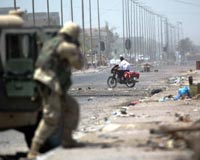|
Iraqi
Gov't Threatens Sadr Despite Ceasefire Talk
 |
|
Sadr
agrees to end fighting in Najaf
|
BAGHDAD,
August 19 (IslamOnline.net & News Agencies) – Iraqi forces could
begin an offensive against Moqtada Al-Sadr within hours, an Iraqi
cabinet minister said on Thursday, August 19, despite the Shiite
leader’s acceptance of a ceasefire proposal.
"We
have clarified that the coming few hours could see the announcement of
the military movement," Minister of State Qassim Dawoud was
quoted by Agence France-Presse (AFP) as telling a press conference.
Dawoud
reiterated demands for Sadr’s Mahdi army militiamen to be disarmed
in all provinces and for the Shiite anti-US occupation firebrand to
submit a written pledge of abandoning all acts of violence.
A
Sadr aide, Ahmed Al-Shaibani, an aide to the firebrand leader, told
Aljazeera that the Shiite leader has asked for the government to send
a delegation to negotiate these terms.
Al-Shaibani
made the statement a few hours after he said Sadr agreed to disarm his
militiamen and pull them out of Najaf they've been taking refuge in,
raising hopes of an end to two weeks of clashes in the holy southern
Baghdad city.
"Sayyed
Moqtada Sadr has sent a message to the national conference in which he
accepted all the conditions extended to him, but there must be a
ceasefire for the steps to be implemented," said Ahmed al-Shaibani,
an aide to the firebrand leader.
Earlier
on Wednesday, August 18, Jalil Al-Shamari, from the religious Dawa
party told the national conference in Baghdad that the anti-occupation
firebrand has accepted the three points set by the conference.
"I
have in my hands the acceptance letter from the Sadr movement and from
Sayyed Moqtada Sadr on the three points put forward by the
conference," Al-Shamari said.
The
Iraqi national conference had put forward Monday, August 16, a new
peace initiative with Sadr to defuse the current standoff between the
anti-occupation firebrand Sadr and the interim government of Iyad
Allawi.
A
group of eight drove to Sadr's office seeking to end the clashes in
the holy city and other parts of Iraq.
However,
Sadr on Tuesday, August 17, failed
to show up for the meeting with the delegation of Iraqi politicians
and religious leaders because of incessant heavy shelling in An-Najaf
by US forces, an aide to the anti-US occupation firebrand said.
US
Advance
 |
|
A
US occupation soldier takes aim down a street at a man on a
motorcycle trying to flee gun shots (AFP)
|
Meanwhile,
Iraqi forces are moving closer to Imam Ali-Shrine in Najaf, where the
Sadr fighters are based, and that four explosions echoed overnight
near the holy site, Aljazeera said.
US
occupation forces, backed by tanks and Bradley armored vehicles were
also seen advancing into the city of Sadr.
"This
is the first time Sadr's Mehdi militia has had to fight across the
entire width of Sadr City. So it's got to throw them off
balance," Lieutenant-Colonel Lopez Carter told a pool reporter
embedded with the troops.
This
came as Washington expressed distrust over Al Sadr's offer to disarm
the Mahdi Army and withdraw from the holy city of Najaf.
"The
Iraqi government has been very clear with Sadr that he has to do some
things, leave the shrine, that he has got to disband his
militia," US National Security Advisor Condoleezza Rice told CNN.
"Nobody
is taking Sadr at his word," she said.
"He's
someone from whom you have to see action. He said lots of words
before. He has never followed through on them. And I don't think
you're going to see an Iraqi government that's going to take his
word."
The
US occupation forces launched
a sweeping offensive
Thursday, August 12, in a bid to crack down on the anti-occupation
Mahdi Army.
Iraqi
Sunni and Shiite leaders slammed the Najaf clashes as a "bloodbath"
and called upon the international community to rein in the American
forces in Iraq.
The
bloody US offensive was also described by law experts as amounting
to genocide,
as it inflicted a heavy toll of deaths and wounded among civilians.
Sadr
has repeatedly called for the US-led forces to pack up and leave the
oil-rich country after more than one and a half years of occupation on
what many ordinary Iraqi believe false pretexts.
The
United States had made the case for the invasion the country, which
has the world’s second oil reserves, on claims on finding weapons of
mass destruction, none of which have been found.
|